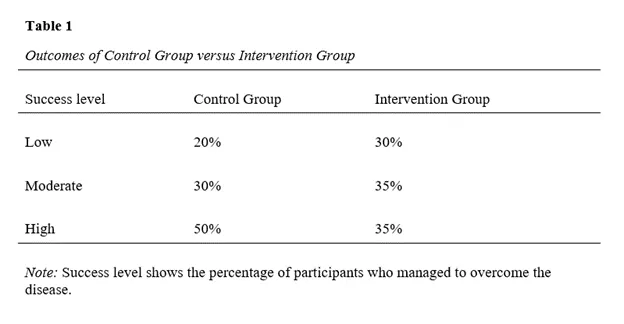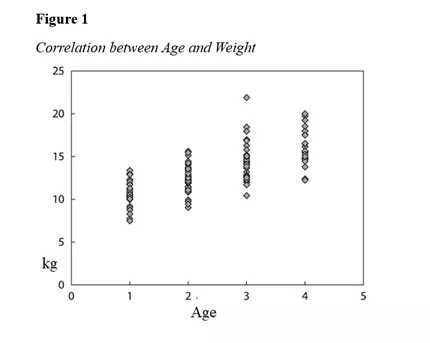APA Citation Style Guide (7th ed.): Referencing & Citing with Examples
This piece of content has been developed by IvyPanda's editorial team.
No AI was involved in the creation process; only qualified experts contributed.
The information, facts, and sources presented in the text have been carefully checked and verified.
You are free to use it with proper referencing.
APA is among the styles you will encounter the most often, and so we have prepared a simple guide to its usage. It is designed by people who have worked on many academic papers to help you with any difficulties that might arise.
This guide is developed in line with American Psychological Association. (2019). Publication manual of the American Psychological Association (7th ed.). Author.
What is APA?
American Psychological Association is an established agency that supports research and education in psychology and related fields of science. APA citation style has been developed by this organization in order to assist researchers with a framework for citing other scholarly works. This citation style is usually used in research papers and assignments on psychology, nursing, medicine, sociology, and associated subject areas. APA differs from other citation styles in capitalization and punctuation. For instance, the names of smaller works in APA are in sentence case, whereas MLA applies title case. Additionally, as opposed to Chicago, APA style does not include footnotes. APA style is very similar to the Harvard referencing system, but there are some minor differences between them.
Why Cite Your Sources?
Citing and referencing other people’s works in your paper is crucial for a number of reasons:
- It enables people to find more information on the topic. When people read your work, they might come upon an exciting idea that they would like to explore further. By citing the source appropriately, you help them to track this information down and locate other articles on the topic, which might help them in research and learning.
- It helps you to avoid plagiarism. Plagiarism is defined as the appropriation of other people’s ideas and the attempt to present them as your own. In the academic community, this is considered to be a severe violation that might affect your future studies and scholarly career. By citing and referencing your sources correctly, you acknowledge that the ideas and information you present came from another person’s work, thus avoiding plagiarism.
- It ensures that you acknowledge other people’s input into the development of a subject field. Most researchers are driven by the desire to improve the volume of knowledge in their area of inquiry. Hence, addressing other scholars’ input shows that you respect their work and commitment. Citing and referencing sources is part of professional ethics in the academic community, and thus, it will help you to build a positive reputation.
General Principles of Formatting in APA
- Double-spacing
- APA Margins – 1″ (2.54 cm), while paper size should be 8.5″ x 11″
- APA recommends using one of the following fonts: 11-point Calibri, 11-point Arial, 10-point Lucida Sans Unicode, 12-point Times New Roman, 11-point Georgia, or 10-point Computer Modern.
APA papers contain page headers at the top of every page with page numbers. Page numbers are inserted flush right.
Papers written in APA style are divided into the following sections:
- Title Page
- Table of Contents (if required)
- Abstract (if required)
- Body
- References
- Appendix (if required)
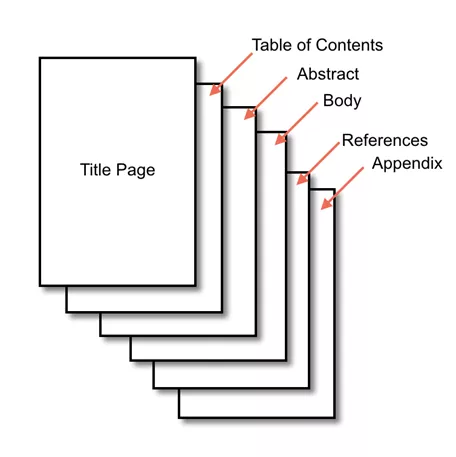
APA Title Page
Header:
Include only page number flush right on the top of each page.
Title:
- Title page should be double-spaced.
- Your title should be centered and inserted in the upper half of the first page, 3-4 lines down from the top.
- Your title should be focused, effective, and succinct.
- Use boldface, upper and lower case (avoid abbreviations and redundant words).
- Insert the author’s name below the title.
- Insert the educational institution below the author’s name, course name, professor’s name, and date.
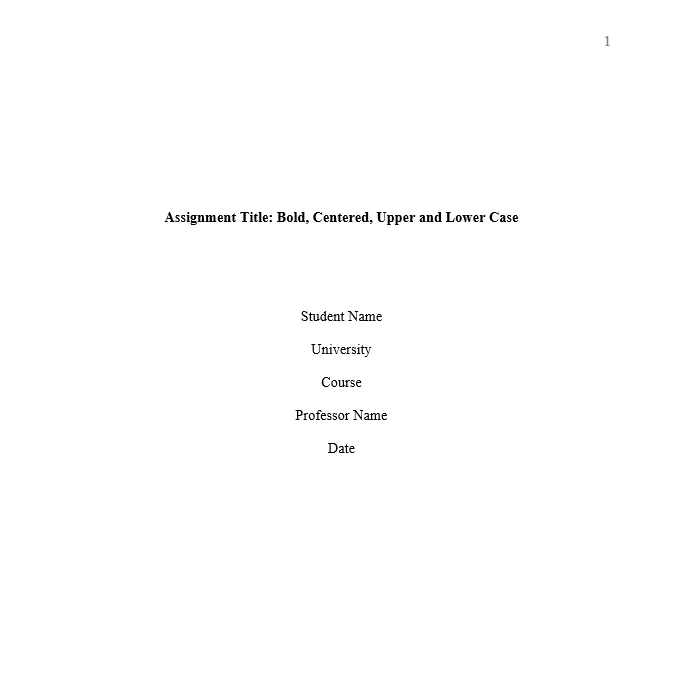
APA Abstract
- Abstract is written on a new page.
- The word “Abstract” is centered on the new page and written in bold. Do not use quotation marks, italics, or any other formatting.
- The text on the abstract page is NOT indented.
- The abstract in APA should contain only the most relevant information, such as research topic/thesis statement, research question(s), sample size/participants, research design/method, data analysis, results, and conclusions.
- The abstract consists of a single paragraph (no more than 250 words) of double-spaced text.
- If keywords are required, they are indented and written beneath the abstract paragraph. Do not forget to use italics for the word “Keywords.”
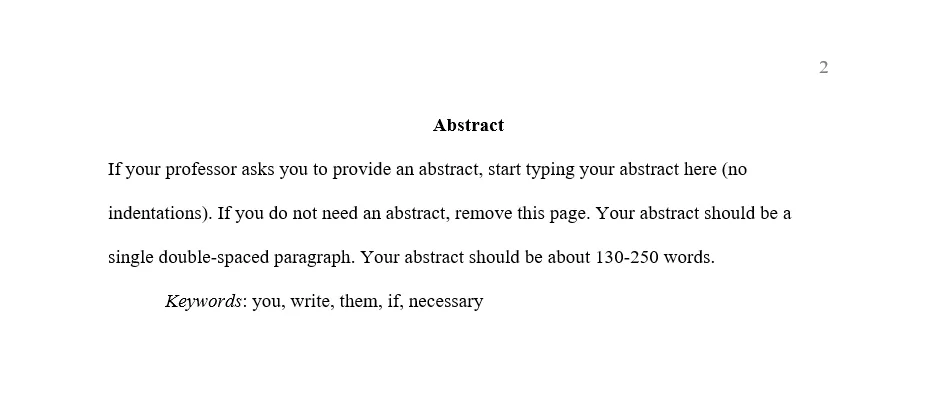
APA Table of Contents
- A table of contents is usually not required for APA papers.
- If your tutor requires one, you may create a table of contents in Word automatically, while applying APA style Level 1 and Level 2 headings.
- Make sure your section title is Table of Contents, and it is bold.
- Follow the whole paper’s font (e.g., Times New Roman 12) to edit your table of contents.
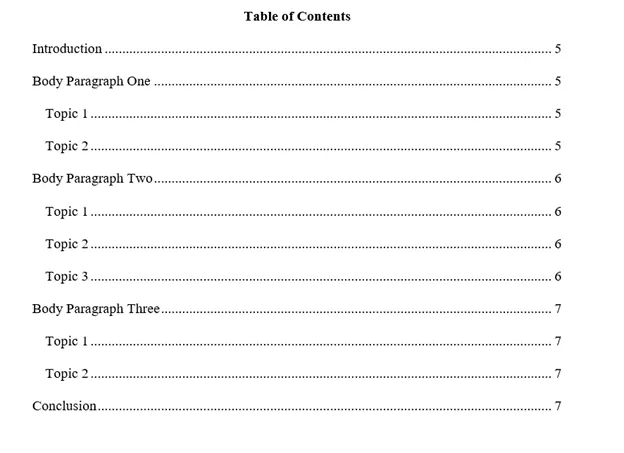
APA Headings
Level 1 Bold, Centered, Uppercase and Lowercase Heading
Level 2 Bold, Flush Left, Uppercase and Lowercase Heading
Level 3 Bold, Italicized, Flush Left, Uppercase and Lowercase Heading
Level 4 Indented, Bold, Uppercase and Lowercase Heading with a Period. Begin your text after the period.
Level 5 Indented, Bold, Italicized, Uppercase and Lowercase Heading with a Period. Begin your text after the period.
APA Reference List
The reference list is inserted at the end of your paper; any source that you use needs to be included in the reference page and cited in the text. At the top of the page, write the section title “References” centered, in bold.
Indent all lines after the first line in the entry (hanging indent); the lines should be indented one-half inch (1.27 cm) from the left margin of your paper.
- Do not forget to invert authors’ names: Last Name, Initials. Example: Cage, D. C.
- The reference list in APA is always alphabetized by the first word in the reference entry (from A to Z).
- When alphabetizing titles or group names as authors, go by the first significant word (disregard a, an, the, etc.)
- No need to use the abbreviation for the group author, just mention the full name of the group.
Correct reference entry:
American Psychological Association. (2022). Talking to your children about the economy and financial fears. https://www.apa.org/topics/money/talking-children-economy
Incorrect reference entry:
American Psychological Association (APA). (2022). Talking to your children about the economy and financial fears. https://www.apa.org/topics/money/talking-children-economy
Journal titles are always presented in full and capitalized:
Archives of General Psychiatry
Do not alter the journal’s name:
JAMA Psychiatry (NOT Jama Psychiatry).
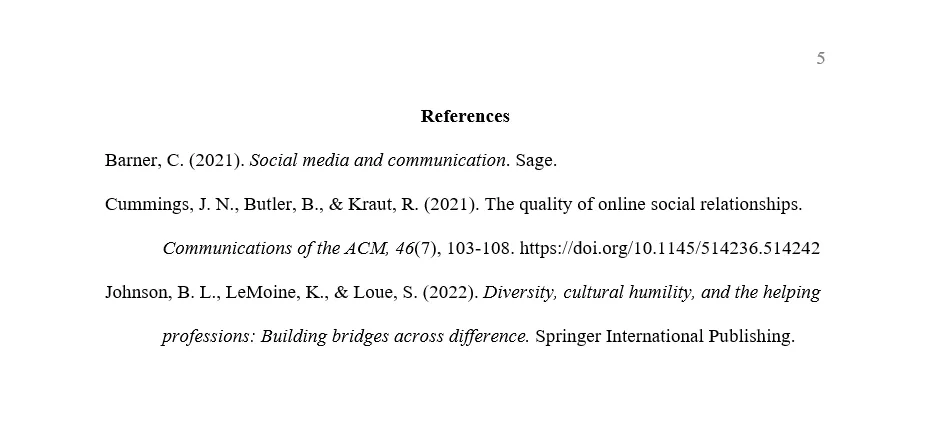
APA Reference List Examples
Citing Books in APA
One author
Last name, First initial. Middle initial. (Year). Book title: Subtitle. Publisher.
Avikunthak, A. (2022). Bureaucratic archaeology: State, science and past in postcolonial India. Cambridge University Press.
Provide the name of the publisher, excluding Co. and Inc., which are not necessary for the identification of the publisher. However, do not omit the words Books and Press.
Two authors
Last name, First initial. Middle initial., & Last name, First initial. Middle initial. (Year). Book title: Subtitle. Publisher.
Fagan, B. M., & Durrani, N. (2021). Archaeology: A brief introduction. Routledge.
Three to twenty authors
Last name, First initial. Middle initial., Last name, First initial. Middle initial., & Last name, First initial. Middle initial. (Year). Book title: Subtitle. Publisher.
Fjeld, R. A., DeVol, T. A., & Martinez, N. E. (2023). Quantitative environmental risk analysis for human health. John Wiley & Sons.
More than twenty authors (books and articles)
Provide last names and initials for the first 19 authors. Insert an ellipsis after the 19th author’s name, do not add an ampersand, and mention the last author’s name. There should be no more than 20 names listed in the citation.
Last name, First initial. Middle initial., Last name, First initial. Middle initial., Last name, First initial. Middle initial., Last name, First initial. Middle initial., Last name, First initial. Middle initial., Last name, First initial. Middle initial., Last name, First initial. Middle initial., Last name, First initial. Middle initial., Last name, First initial. Middle initial., Last name, First initial. Middle initial., Last name, First initial. Middle initial., Last name, First initial. Middle initial., Last name, First initial. Middle initial., Last name, First initial. Middle initial., Last name, First initial. Middle initial., Last name, First initial. Middle initial., Last name, First initial. Middle initial., Last name, First initial. Middle initial., Last name, First initial. Middle initial.,… Last name, First initial. Middle initial. (Year). Book title: Subtitle. Publisher.
Gaulton, K. J., Almgren, P., Mahajan, A., Go, M. J., Zhang, W., Below, J. E., Ferreira, T., Horikoshi, M., Johnson, A. D., Ng, M. C. Y., Prokopenko, I., Saleheen, D., Wang, X., Zeggini, E., Abecasis, G. R., Adair, L. S., Atalay, M., Aung, T., Baldassarre, D., … Morris, A. P. (2024). Genome-wide trans-ancestry meta-analysis provides insight into the genetic architecture of type 2 diabetes susceptibility. Nature Genetics, 46, 234–244.
Corporate/organization author
Organization Name. (Year). Book title: Subtitle. Publisher.
National Intelligence Council. (2021). Global trends 2040: A more contested world. Cosimo Reports.
Entries in reference works (e.g. dictionaries, thesauruses, and encyclopedias) without credited authors are also considered works with group authors.
Unknown author
When the work does not have an author, move the title of the work to the beginning of the references and follow with the date of publication. Only use “Anonymous” if the author of the work is signed “Anonymous.”
Book title: Subtitle. (Year). Publisher.
The Merriam-Webster Dictionary. (2022). Merriam-Webster.
Two or more works by the same author
Works by the same author are arranged chronologically by year of publication. The earliest year comes first. List references with no dates before references with dates.
Malhotra, Y. (n.d.). Project management: Key processes. Elsevier.
Malhotra, Y. (2022). Knowledge management and virtual organizations. SAGE.
Malhotra, Y. (2024). Managing organizations: An introduction to theory and practice. Pearson.
When an author appears both as a sole author and, in another citation, as the first author of a group, list the one-author entries first.
Griffin, R. W. (2022). Fundamentals of management. Cengage Learning.
Griffin, R. W., & Ebert, R. J. (2020). Business essentials. Pearson.
Two or more works by the same author, same year
Works by the same author and with the same publication date are listed alphabetically by the title (disregarding articles). Add a, b, c … to the publication year to distinguish citations.
Prasad, L. M. (2020a). Organizational behavior. Sultan Chand & Sons.
Prasad, L. M. (2020b). Principles and practice of management. Sultan Chand & Sons.
Edited book, no author
In an APA reference to an edited book with no author, move the editor name to the author position and follow it with the parenthetical abbreviation (Ed.) for one editor or (Eds.) for multiple editors.
Editor’s last name, First initial. Middle initial. (Ed.). (Year). Book title: Subtitle. Publisher.
Editor’s last name, First initial. Middle initial., & Editor’s last name, First initial. Middle initial. (Eds.). (Year). Book title: Subtitle. Publisher.
Davison, N., & Matthews, D. (Eds.). (2023). A handbook for trainee nursing associates. Scion Publishing.
Edited book with an author/authors
When citing an edited source in APA, place the editor’s initials and last name in brackets immediately after the book’s title, followed by a comma and the abbreviation Ed. for one editor or Eds. for multiple editors.
Author’s last name, First initial. Middle initial. (Year). Book title: Subtitle (Editor’s first initial. Middle initial. Last name, Ed.). Publisher.
Vafeas, C., & Slatyer, S. (2020). Gerontological nursing: A holistic approach to the care of older people (M. Trudgeon, Ed.). Elsevier Health Sciences.
Author with a translator
In a reference to a translated book, place the name(s) of the translator(s) immediately after the book’s title, add the abbreviation Trans., and enclose in parentheses.
Author’s last name, First initial. Middle initial. (Year). Book title: Subtitle (Translator’s first initial. Middle initial. Last name, Trans.). Publisher.
Author’s last name, First initial. Middle initial. (Year). Book title: Subtitle (Translator’s first initial. Middle initial. Last name & Translator’s first initial. Middle initial. Last name, Trans.). Publisher.
Camus, A. (2021). The plague (L. Marris, Trans.). Knopf Doubleday Publishing Group. (Original work published 1947).
APA in-text citation of a republished source also includes both publishing dates. Example: Camus (1947/2021).
Different editions
Include information about the edition in parentheses immediately after the title.
Last name, First initial. Middle initial., & Last name, First initial. Middle initial. (Year). Book title: Subtitle (1st/2nd/3rd/#th ed.). Publisher.
Alligood, M. R. (2022). Nursing theorists and their work (10th ed.). Elsevier Health Sciences.
Chapter in an edited book
When citing a chapter in an edited book, do not invert the editors’ names and do not place them in the author position. The editors’ names are preceded by the word In and followed by the parenthetical abbreviation (Ed.) for one editor or (Eds.) for several editors.
if an editorial board consists of more than 3 members, include the name of the lead editor and follow it by et al.
Author’s last name, First initial. Middle initial. (Year). Chapter title: Subtitle. In Editor’s first initial. Middle initial. Last name (Ed.), Book title: Subtitle (pp. #–#). Publisher.
Author’s last name, First initial. Middle initial. (Year). Chapter title: Subtitle. In Editor’s first initial. Middle initial. Last name et al. (Eds.), Book title: Subtitle (pp. #–#). Publisher.
Dossey, B. M. (2023). Nursing: Integral, integrative, and holistic – local to global. In B. M. Dossey & L. Keegan (Eds.), Holistic nursing: A handbook for practice (pp. 1-53). Jones & Bartlett Publishers.
List any edition number in the same set of parentheses as the page numbers, separated by a comma: (# ed., pp. 33-45).
Turner, M. (2023). Physical activity promotion. In S. R. Thompson (Ed.), The essential guide to public health and health promotion (2nd ed., pp. 169-180). Taylor & Francis.
Multivolume work
Enclose information about volume number(s) in parentheses immediately after the book’s title.
Last name, First initial. Middle initial. (Year). Book title: Subtitle (Vols. #–#). Publisher.
Freedheim, D. K., & Weiner, I. B. (2021). Handbook of psychology (Vol. 1). John Wiley & Sons.
Encyclopedia/dictionary
Follow the citation rules for Corporate/organization author if there is no author, or Chapter in an edited book/Edited book, no author depending on the publication details available.
Foreword, introduction, preface, or afterword
Cite the publishing information about a book as usual, but cite Introduction, Preface, Foreword, or Afterword (whatever title is applicable) as the chapter of the book.
Last name, First initial. Middle initial. (Year). Foreword (or Introduction, Preface, Afterword). In Editor’s first initial. Middle initial. Last name (Ed.), Book title: Subtitle (pp. #–#). Publisher.
Owen, P. (2023). Foreword. In S. R. Thompson (Ed.), The essential guide to public health and health promotion (2nd ed., pp. i-iii). Taylor & Francis.
Electronic or Kindle-Books
It is not necessary to note that you have used an eBook or audiobook when the content is the same as a physical book. However, you should distinguish between the eBook or audiobook and the print version if the content is different or abridged, or if you would like to cite the narrator of an audiobook.
Last name, First initial. Middle initial. (Year). Book title: Subtitle. Publisher. URL (if applicable)
Serafino, E. P., & Smith, T. W. (2020). Health psychology: Biopsychosocial interactions (9th ed.). Wiley. https:// www.amazon.co.uk/gp/product/ B01N0TLF2I/
Lencioni, P. (2024). The five dysfunctions of a team: A leadership fable (C. Stransky, Narr.) [Audiobook]. Random House Audio.
Online encyclopedia/dictionary with a group author
Institution or organization name. (Year). Title of entry. In Title of reference work. URL
Longman. (n.d.). Cause. In Longman dictionary of contemporary English. Retrieved February 20, 2020, from https://www.ldoceonline.com/dictionary/cause
An online dictionary, thesaurus, or encyclopedia may be continuously updated and therefore not include a publication date (like in the example below). If that’s the case, use “n.d.” for the date and include the retrieval date in the citation.
Online encyclopedia/dictionary with an individual author
Last name, F. M. (Year). Title of entry. In F. M. Last name (Ed.), Title of reference work (edition). Publisher. URL or DOI
Long, R. (n.d.). Egalitarianism. In J. Fieser & B. Dowden (Eds.), Internet encyclopedia of philosophy. Retrieved February 20, 2020, from https://www.iep.utm.edu/egalitar/
Citing Articles in Periodicals in APA
Scholarly journal article
Last name, First initial. Middle initial. (Year). Title of the article. Journal Title, volume(number), pages–pages. https://doi.org/xx.xxx/yyyy
Dimaggio, G. (2022). Treatment principles for pathological narcissism and narcissistic personality disorder. Journal of Psychotherapy Integration, 32(4), 408–425. https://doi.org/10.1037/int0000263
APA 7 advises writers to include a DOI (if available), even when using the print source.
Magazine article
Last name, First initial. Middle initial. (Year, Month Date). Title of the article. Magazine Title, volume(number), pages–pages.
Ganz, R. (2023, September-October). The beautiful after. This Magazine, 57(2), 14-20.
Newspaper article
Last name, First initial. Middle initial. (Year, Month). Title of the article. Newspaper Title, pages-pages.
Strauss, A. (2022, January). Getting education reform right. Washington Post, 2-3.
Review article
Last name, First initial. Middle initial. (Year). Title of the article [Review of the book Book title: Subtitle, by Author’s initial Last name]. Journal Title, volume(number), pages–pages.
Das, J., & Adhikary, B. (2023). Portraying the Dalits [Review of the book Contested Representation by D. Rai]. Media Asia, 1-4. https://doi.org/10.1080/01296612.2023.2247638
Abstract
APA 7th edition does not provide guidance on how to cite abstracts. However, if you only use information from the abstract but the full text of the article is also available, we advise you to add “[Abstract]” after the article or source name. If the full text is not available, you may use an abstract that is available through an abstracts database as a secondary source.
Last name, First initial. Middle initial. (Year). Title of the article [Abstract]. Journal Title, volume(number), pages–pages.
Weatherly, N. L. (2021). The ethics of organizational behavior management [Abstract]. Journal of Organizational Behavior Management, 41(3), 197-214. https://www.tandfonline.com/doi/abs/10.1080/01608061.2021.1890664
Article in an online journal (DOI)
According to the 7th edition of the APA Style Guide, it is advisable to provide an available DOI of an article (digital object identifier) as a hyperlink: https://doi.org/10.0000/0000
Last name, First initial. Middle initial. (Year). Title of the article. Journal Title, volume(number), pages–pages. https://doi.org/10.0000/0000
Langel, S. N., Wang, Q., Vlasova, A. N., & Saif, L. J. (2020). Host factors affecting generation of immunity against porcine epidemic diarrhea virus in pregnant and lactating swine and passive protection of neonates. Pathogens, 9(2), 130. https://doi.org/10.3390/pathogens9020130
Article in an online journal (without DOI)
If an online scholarly journal article has no DOI and is published on a website, include the URL. If an online scholarly article has no DOI and is published on a database, do not include a URL or any database information. The only exception is for databases that publish articles that are in limited circulation (like ERIC) or that are only available on that particular database (like UpToDate). You should also include the date that you accessed the article.
Last name, First initial. Middle initial. (Year). Title of the article. Journal Title, volume(number), pages–pages. Retrieved Month Date, Year, from http://xxxxx
Flannery, M. C. (2020). Does that star spangled banner yet wave? The origins and meaning of a national anthem. TLS: Times Literary Supplement, 6135, 11. Retrieved March 7, 2024, from https://link.gale.com/apps/doc/A646304333/LitRC?u=anon~bb1f1081&sid=googleScholar&xid=d7a2bfbb
Online newspaper / magazine article
Last name, First initial. Middle initial. (Year, Month Date). Title of the article. Newspaper/Magazine Title. URL.
Smialek, J., & Copeland, R. (2024, March 5). Bank runs spooked regulators. Now a clampdown is coming. The New York Times. https://www.nytimes.com/2024/03/05/business/economy/silicon-valley-bank-federal-reserve.html
Citing Dissertations and Theses in APA
Dissertation/thesis, published
Last name, First initial. Middle initial. (Year). Title of dissertation or thesis (Publication No. XXX) [Doctoral dissertation/Master’s thesis, Name of Institution Awarding the Degree]. Database or Archive name.
Gowlers, D. M. (2023). Exploring the correlation between childhood traumas and development of narcissistic personality disorder (Publication No. 1997328) [Master’s thesis, Purdue University]. ProQuest Dissertations Publishing.
Dissertation/thesis, unpublished
Last name, First initial. Middle initial. (Year). Title of dissertation/thesis [Unpublished doctoral dissertation/master’s thesis]. Name of Institution Awarding the Degree.
Dewis, S. S. (2021). The connection between beliefs about medications and the utilization of prescribed long-term medications [Unpublished doctoral dissertation]. New York State University.
Conference proceedings
Conference proceedings published in a journal or a book can follow the same format as for a journal article, chapter/article in an edited book, or a full edited book.
Last name, First initial. Middle initial, & Lastname, First initial. Middle initial. (Eds.). (Year). Title of proceedings. Publisher. URL. (if applicable)
Neta, G., Chambers, D. A., & Simpson, L. (Eds.). (2020). Proceedings from the 12th annual conference on the science of dissemination and implementation. Arlington Publishing.
Citing Online Lectures and Presentation Slides in APA
When citing online lecture notes, be sure to provide the file format in brackets after the lecture title (e.g. PowerPoint slides, Word document).
Last name, First initial. Middle initial. (Year). Document title [Lecture notes, PowerPoint slides, etc]. Publisher. URL
Josiah, S. (2023). E-commerce [PowerPoint slides]. SlideShare. https://www.slideshare.net/Susan130641/ecommerce-261470434
Citing Online Sources in APA
Page from website
If the page names an individual author, cite their name first:
Last name, First initial. Middle initial. (Year). Website page title. Site Name. URL.
Janous, B. (2020, February 13). A love that cancer can’t kill. Human Parts. https://humanparts.medium.com/a-love-that-cancer-cant-kill-5f1398b13a1a
If the resource was written by a group or organization, use the name of the group/organization as the author. Additionally, if the author and site name are the same, omit the site name from the citation.
Group name. (Year, Month Date). Website page title. Site Name. URL.
American Society for the Prevention of Cruelty to Animals. (2020, February 21). Celebrate national dog biscuit day with your favorite furry friends! https://www.aspca.org/news/celebrate-national-dog-biscuit-day-your-favorite-furry-friends
Page from website with unknown author
If the page’s author is not listed, start with the title instead. Additionally, include a retrieval date when the page’s content is likely to change over time (like, for instance, if you’re citing a wiki that is publicly edited).
Website page title. (Year, Month Date). Site Name. Retrieved Month Date, Year, from URL.
Puppies for adoption: How, and where to adopt a puppy. (n.d.). Retrieved February 23, 2020, from https://www.petfinder.com/pet-adoption/dog-adoption/puppies-for-adoption/
Data sets
Last name, First initial. Middle initial. or Name of Group. (Year). Title of dataset (Version No.) [Data set]. Publisher. DOI or URL
DataHub. (n.d.). CO2 PPM – Trends in atmospheric carbon dioxide [Data set]. https://datahub.io/core/co2-ppm
Graphic data (e.g. interactive maps, infographics, and other graphic representations of data)
Give the name of the organization or individual followed by the date and the title. If there is no title, in brackets, you should provide a brief explanation of what type of data is there and in what form it appears. Include the URL and the retrieval date if there is no publication date.
Visually. (n.d.). 6 ways to use psychology to boost app engagement [Infographic]. Retrieved February 23, 2020, from https://visual.ly/community/infographic/computers/6-ways-use-psychology-boost-app-engagement
Qualitative data and online interviews
If an interview is not retrievable in audio or print form, cite the interview only in the text (not in the reference list) and provide the month, day, and year in the text. If the interview transcript is published in an online periodical, like a magazine, cite the interview the same way you would cite the medium where it is published, as shown below:
Beard, A. (2023, August 15). Life’s work: An interview with Chris Paul. Harvard Business Review Magazine. https://hbr.org/2023/09/lifes-work-an-interview-with-chris-paul
If it is an audio file or transcript published in a database, credit the interviewee as the author and use the following model:
Berkow, I. (1997, June 27). Interview with Ira Berkow [Interview]. Studs Terkel Radio Archive; The Chicago History Museum. Retrieved February 23, 2020, from https://studsterkel.wfmt.com/programs/interview-ira-berkow-0
Computer software/downloaded software
Do not cite standard office software (e.g. Word, Excel) or programming languages. Provide references only for specialized software.
Last name, First initial. Middle initial. or Name of Group. (Year). Title of software (Version No.). [Computer software]. Publisher. URL.
Systweak. (n.d.). Advanced driver updater for Windows (Version 2.1.1086.15131). [Computer software]. Softsonic. https://advanced-driver-updater.en.softonic.com/
E-mails are not included in the list of references, though you should parenthetically cite them in your main text:
(J. Datsun, personal communication, March 3, 2020).
Online forum or discussion posting
Last name, First initial. Middle initial. or Name of Group [username]. (Year, Month Date). Title of post [Online forum post]. Publisher. URL.
Elaine [ElaineNY]. (2020, February 23). A stranger got my kidney on January 20, 2020 [Online forum post]. Reddit. https://www.reddit.com/r/IAmA/comments/f8efmz/a_stranger_got_my_kidney_on_january_20_2020/
X Post
Last name, First initial. Middle initial. or Name of Group [@username]. (Year, Month Date). Content of the post up to the first 20 words [Post]. Site Name. URL
Van Dyke, S. [@3WSSheri]. (2020, February 23). Watched Supe on Saturdays back in Mansfield. introduced me to some classic horror flicks [Post]. X. https://twitter.com/3WSSheri/status/1231653764219711492
If the post has images, videos, or links to other sources, you can mention these data in brackets after the content description. Make sure to replicate emojis used.
X profile
Last name, First initial. Middle initial. or Name of Group [@username]. (n.d.). Profile name [X profile]. Retrieved Month Date, Year, from URL.
Chavira, P. [@apchavira]. (n.d.). Paulina Chavira [X profile]. Retrieved February 24, 2020, from https://twitter.com/apchavira
Facebook post
Last name, First initial. Middle initial. or Name of Group. (Year, Month Date). Content of the post up to the first 20 words [Type of post]. Site Name. URL
Nicola, C. (2020, February 22). Chris, Jay and Elvira continuing to have fun in Bahia, Salvador, BRAZIL celebrating CARNAVAL [Images attached] [Status update]. Facebook. https://www.facebook.com/chris.nicola/posts/10218605512262988
If the Facebook post includes images, videos, or links to other sources, indicate that information in brackets after the content description. Also attempt to replicate emojis if possible.
Facebook page
Last name, First initial. Middle initial. or Name of Group. (n.d.). Home [Facebook page]. Site Name. Retrieved Month Date, Year, from URL
Jasper, S. (n.d.). Home [Facebook page]. Facebook. Retrieved February 24, 2020, from https://www.facebook.com/stefanie.jasper.1
Instagram photo or video
Last name, First initial. Middle initial. or Name of Group [@username]. (Year, Month Date). Content of the post up to the first 20 words [Type of post]. Site Name. URL
Winslet, K. [@kate.winslet.official]. (2020, February 21). Love always wins! [Photograph]. Instagram. https://www.instagram.com/p/B8yx4bZDLgK/
Ted talk
Last name, First initial. Middle initial. (Year, Month Date). Title of talk [Video]. TED. URL
Shahidi, Y. (2023, April). Let curiosity lead [Video]. TED. https://www.ted.com/talks/yara_shahidi_let_curiosity_lead?hasSummary=true
Blog post
Last name, First initial. Middle initial. (Year, Month Date). Blogpost title. Blog Title. URL.
Cole, M. (2022, March 1). Do I believe the best in others? John C. Maxwell. https://www.johnmaxwell.com/blog/do-i-believe-the-best-in-others/
Blog titles are in italics since they are treated as periodicals.
Video or film
Director’s Last name, First initial. Middle initial. (Director). (Year). Video/Film title [Film]. Production company.
Kosinski, J. (Director). (2022). Top Gun: Maverick [Film]. Paramount Pictures.
Video or film in another language
Director’s Last name, First initial. Middle initial. (Director). (Year). Video/Film title in original language [Translated title] [Film]. Production company.
Hamaguchi, R. (Director). (2021). Doraibu mai kā [Drive my car] [Film]. C&I Entertainment.
TV series
Executive producer’s Last name, First initial. Middle initial. (Executive Producer/s). (Date range of release). TV series title [TV series]. Production company(ies).
Crane, D., & Kauffman, M. (Executive Producers). (1994-2004). Friends [TV series]. Warner Bros. Studios.
TV series episode
Writer’s Last name, First initial. Middle initial (Writer), & Director’s Last Name, First initial. Middle initial. (Director). (Original air date: Year, Month Date). Episode title (Season number, Episode number) [TV series episode]. In Executive Producer’s First initial. Middle initial. Last name (Executive Producer), Series title. Production company(ies).
Borkow, D. K. (Writer), & Schwimmer, D. (Director). (2001, October 4). The one with the red sweater (Season 8, Episode 2) [TV series episode]. In D. Crane & M. Kauffman (Executive Producers), Friends. Warner Bros. Studios.
YouTube video
Last name, First initial. Middle initial. (Year, Month Date). Video title [Video]. Website host. URL.
ABC News. (2021, October 29). Signs of child abuse and how to spot it [Video]. YouTube. https://youtu.be/5F5mBsxKCgc
Music album
Recording artist (Year of release). Title of album [Album]. Record label.
Adele. (2015). 25 [Album]. XL; Columbia.
if you are referencing a re-recorded version of a classical work, list that album title in brackets following the name of the album.
Single song or track
Recording artist (Year of release). Title of song [Song]. On Title of album [Album]. Record label.
Adele. (2015). Hello [Song]. On 25 [Album]. XL; Columbia.
- if the song is a piece of classical music, you can list the composer instead of the recording artist.
- if the song does not have an associated album, simply omit the section with the album.
Podcast
Executive Producer’s Last name, First initial. Middle initial. (Executive Producer). (Range of publication). Title of podcast [Audio podcast]. Production company. URL.
Catt, G. (Executive Producer). (2022, October 19). Operation satellite (No. 11) [Audio podcast episode]. In The missing cryptoqueen. BBC. https://www.bbc.co.uk/programmes/p0d80c0w
- you can also mention the host of the podcast instead or next to the executive producer.
- no need to mention the URL if you have accessed via a podcast app which means you don’t have a link for it.
Single podcast episode
Executive Producer’s Last name, First initial., Middle initial. (Executive Producer). (Date of publication). Title of podcast episode (Episode number) [Audio podcast episode]. In Title of podcast. Production company. URL.
Catt, G. (Executive Producer). (2019). The technology and the dream (No. 8) [Audio podcast episode]. In The missing cryptoqueen. BBC. https://www.bbc.co.uk/programmes/p07sz990
- in place of the executive producer, you can also list the host of the podcast.
- if you did not access the podcast via an online source (e.g., if you used a podcast app), omit the URL.
Artwork in a museum or on a museum website
Artist’s Last name, First initial. Middle initial. (Year of release). Title of artwork [Medium]. Name of museum, City, State, Country. URL of museum.
Van Gogh, V. (1889). Starry night [Painting]. MoMA, New York, NY, United States. https://www.moma.org/collection/works/79802
- if the artwork is available via a museum website, cite that website at the end of the citation. If there is no associated website, simply omit the URL.
- if the artwork does not have a title, briefly describe the work and put that description in square brackets.
Photograph (not associated with a museum)
Photographer’s Last name, First initial. Middle initial. (Year of publication). Title of photograph [Photograph]. Source. URL.
Lovett, G. (2023). An owl at the new Busch Wildlife Sanctuary in Jupiter, Fla., on Dec. 19, 2023 [Photograph]. USA Today. https://www.usatoday.com/picture-gallery/life/animalkind/2023/12/27/best-animal-photos-2023/72041688007/
if the photograph does not have a title, describe the photograph and put that description in square brackets.
Personal communication
Personal communication is not included in the reference list. Instead, when citing information from an email, cite the source of information in parentheses.
(K. Dawson, personal communication, April 24, 2022).
Citing Government Documents in APA
Federal or state statute
Name of Act, Public Law No. (Year). URL.
Americans with Disabilities Act, Publ. L. No. 101-336, 104 Stat. 327 (1990). https://www.govinfo.gov/content/pkg/STATUTE-104/pdf/STATUTE-104-Pg327.pdf
Report by a government agency or other organization
Organization Name. (Year). Title of report. URL.
United States Government Accountability Office. (2020). Science & tech spotlight: Deepfakes. https://www.gao.gov/assets/gao-20-379sp.pdf
Report by individual authors at government agency or other organization
Last name, First initial. Middle initial., & Last name, First initial. Middle initial. (Year). Title of report. Organization Name. URL.
Schreiber, S., Pasternak, S., & Gilley, K. (2023). Trends in state mental health policy 2022: State legislation report. National Alliance on Mental Illness. https://www.nami.org/NAMI/media/NAMI-Media/PDFs/NAMI_2022_State_Legislation_Report.pdf
APA In-text Citations
In accordance with APA style rules, you only need to include the author’s name and year of publication when you refer to information from another scholarly work without quoting it directly. Remember that each source you cite in the body of the paper must have a corresponding entry on the list of references at the end of the paper.
Author named in a signal phrase
APA format requires the use of the word and instead of the ampersand before the last author’s name when citing a work by multiple authors in the text.
Greene and Kernis (2022) argued that every individual involved in the process of creation of software is responsible for its quality.
Author not named in a signal phrase
The framework based on the categorization of racial attributes does not take into account numerous individual differences between ethnic groups (Holland, 2020).
A work by two authors
The use of sterilization accounts for 3.2 percent of birth control methods in Christian communities (Purnell & Paulanka, 2023).
A work by three or more authors
Regardless of the medium of the source, all sources with three authors or more are now attributed using the name of the first author followed by “et al.” List only the first author’s name followed by “et al.” in every citation, even the first.
Sleep disturbances usually lead to significantly increased stress levels, and addressing sleep problems can help reduce anxiety (Jones et al., 2021).
The only exception to this occurs when doing so would create ambiguity (e.g., if two papers have first-listed authors with the same name). In these cases, list as many names as needed to differentiate the papers, followed by “et al.”
Judith, Leon, Potter, and Grief (2020) and Judith, Leon, Carrol, and Smith (2020) can be cited as (Judith, Leon, Potter, et al., 2020) and (Judith, Leon, Carrol, et al., 2020), respectively.
Unknown author
When the source does not identify an author, cite it by the first few words of its title. The titles of books and periodicals have to be italicized, whereas titles of book chapters and articles must be placed inside quotation marks. APA style calls for capitalizing important words in titles when they are written in the text (but not when they are written in reference lists).
Naturalism and the improvement of health-care outcomes are the main principles of the provision of biomedicine in the U.S. (Biomedicine and health care, 2023).
The health-care services in Australia are based on the long-standing culture of nursing as well as national models of health and illness (“Health care approaches,” 2021).
Corporate author
If the name of the group first appears in parentheses (as in the second example below), put the abbreviation in brackets after it, followed by a comma and the year for the citation:
The American Psychological Association (APA, 2021) suggested that parents talk to their children about family finances in age-appropriate ways.
Children should learn about family finances in age-appropriate ways (American Psychological Association [APA], 2021).
In the reference list entry, do not include the abbreviation for the group author. Instead, spell out the full name of the group.
Authors with the same last name
Include first initials followed by the last names in order to distinguish between authors with the same last name.
Religious and spiritual beliefs of Arab American Muslims significantly influence their health-care practices and health-seeking behaviors (M. Berndt, 2022; L. Berndt, 2022).
More than one work by the same author in the same year
Distinguish between works by the same author in the same year by including lowercase letters next to the year of publication in both in-text citations and reference list entries.
Terminally ill patients find a source of strength in performing daily prayers and adhering to other religious duties described in their sacred texts such as Bible and Quran (Robbins, 2021a; Robbins, 2021b).
Indirect sources
Provide the author of the original source in a signal phrase and include a citation of the secondary source in parentheses. Note that only the secondary source has to be included in the APA reference list.
Smith (2020) argues that “personalistic systems provide the most accurate representation of a patient’s specific identity” (as cited in Williams, 2024, p. 223).
Sources without page numbers
Use the heading or section name, an abbreviated heading or section name, a paragraph number (para. 1), or a combination of these. When an electronic document has numbered paragraphs, use the abbreviation “para.” followed by the paragraph number (Hall, 2021, para. 5). If the paragraphs are not numbered and the document includes headings, provide the appropriate heading and specify the paragraph under that heading.
- Pinker and Smith (2023) went so far as to argue “that Chinese cultures condone the use of invasive health care procedures” (para. 11).
- According to Smith (2021), … (Mind Over Matter section, para. 6).
Tables and Figures in APA
Though the formatting for tables and figures has not dramatically changed from the sixth edition, a few relevant changes are as follows:
Tables and figures are now formatted in parallel—in other words, they use consistent rules for titles, notes, and numbering.
Tables and figures may now be presented either in the text of the document or after the reference list on separate pages.
When you want to enhance your paper by providing visual data, you need to ensure that you format your tables and figures in accordance with APA guidelines:
- Data that would require only one or two columns to present should be in written form, and thus, all tables should have three or more columns.
- Refer to tables and figures in the text of the paper (Figure 1; Table 3) and include them after the end of the paragraph or in the appendix.
- Tables and figures should be numbered in the same sequence in which they are presented in the text (e.g., Figure 1, Figure 2, etc.).
- If tables or figures are in the appendix, use capital letters and Arabic numbers to distinguish between them.
- Label all of your figures and tables appropriately.
- For tables, you need to write the table number (boldface) and add the table title below (italicized, capitalizing the notional words).
Table 1
Comparison of Regression Results
If the table/figure is taken from another source, add a note designated by the word Note (italicized) followed by a period:
Note. Adapted from Management Research, by J. Jones, 2023, p. 15. Copyright 2023 by Routledge.
For figures, you need to write the figure number (boldface) and add the figure title below (italicized, capitalizing the notional words)
Figure 1
Stress Levels Changes in Healthcare Settings, 2020-2022
Basic table and figure formats advised by APA editors:
